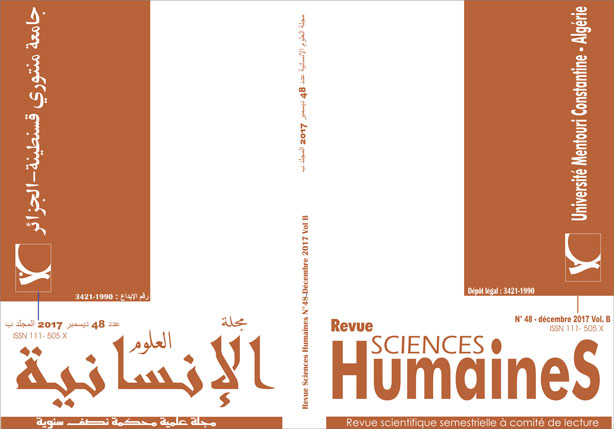The Role of employee satisfaction in enhancing employee’ performance– An empirical study on a sample of pharmacies of the state of Khenchela (Algeria)
الكلمات المفتاحية:
employee satisfaction، employee performance، Algerian pharmaciesالملخص
The aim of this study is to empirically examine the employee satisfaction and its relationship with the enhancing of employee performance in Algerian pharmacies. We found that: “employee satisfaction” is positively associated with “employee performance” in Algerian pharmacies. There is a statistically significant difference amongst the employees in Algerian pharmacies due to privacy determinants (gender, experience, and education level).
التنزيلات
المراجع
Abdulwahab S. Bin Shmailan, (2016), “The relationship between employee satisfaction, employee performance and employee engagement: An explorative study”, Issues in Business Management and Economics”, Vol.4 (1), P1.
Sabine Sonnentag, Judith Volmer and Anne Spychala, (2010), “Employee Performance”, Micro approaches, sage handbook of organizational behavior; Vol01, edition by Julian Barling, Los angeles, Calif, 1st publication, P427.
Campbell , J.P, McCloy,R.A, S.H. and Sager, C.E, (1993), “A theory of performance”, San Francisco, Jossey Bass,.
Pulakos, E.D, Arad, S., Donovan,M.A, and Plamondon, (2000), “Development of taxonomy of adaptive performance”, Journal of Applied Psychology,85.
- Hafiza et al., (2011). Relationship between rewards and Employees motivation in the nonprofit organizations of Pakistan. Business Intelligence Journal, vol. 1 No. 1. 327 –335.
Afshan, S., Sobia, I., Kamran, A. & Nasir, M. (2012), “Impact of training on Employee performance: a study of telecommunication sector in Pakistan”. Interdisciplinary Journal of Contemporary Research in Business 4, 6.
AIDAH NASSAZI, (2013), ‘Effect of training on employee performance: Evidence from Uganda”, economics and tourism, p13.
Armstrong, M. and Murlis, H.(2004). Reward management: A handbook of remuneration strategy and practice. 5th edition. London: Kogan Page Limited.
Murphy, P. R. and Jackson, S. E. (1999) 'Managing Work Role Performance. Challenging the TwentyFirst Century Organizations and Their Employees', in D. R. ligen and E. D. Pulakos (eds), The Changing Nature of Performance: Implications for Staffing, Motivations, and Development. San Francisco: Jossey-Bass, pp. 325-365. 10. Benjamin Owusu, ‘2014), “an assessment of employee satisfaction and its effect onemployees’ performance: a case of mining companiesin the [bibiani – anhwiaso – bekwai district] in the western region”, School of Business, KNUST.
Compbell et al, (1990), “Modeling the performance prediction problem in industrial and organizational psychology”, Handbook of Industrial and Organizational Psychology, palo Alto: Consulting Psychologists Press, Vol(01).
Ibd.
Viswesvaran, C. ones, D.S. and Schmidt, F.L,( 1996),“Comparative analysis of the reliability of Employee performance rating”: Journal of Applied Psychology, 81.
Campbell, J. P. (1999). The definition and measurement of performance in the new age. In D. R.Ilgen & E. D. Pulakos (Eds.),The changing nature of performance. Implications for staffing, motivation,and development(pp. 399–429). San Francisco: Jossey-Bass.
Sabine Sonnentag et al, (2010), «,Job Performance », micro approaches (sage handbook of organizational behavior), vol(01), 1st pub, edition: Julian Barling, Los Angeles, Calif, pp427-428
.Ibd.,P431.
McCourt, W. and D. Eldridge (2003) ‘Performance Management and Appraisal’ In McCourt Willy and Eldridge Derek (ed) Global Human Resource Management, UK: Edward Elgar Publishing limited. Pp 208-235.
AIDAH NASSAZI, 2013, OP, cit, P17.
-Armstrong, M. and Murlis, H., (2001), “Reward Management: A handbook of remuneration strategy and practice”, 5th Edition, London: Kogan Page Limited, 2004.
-Cronje, G.J, de J. du Toit, G.S. and Motlatla, M.D.C, « Introduction to Business management», 5th Ed, cape Town : oxford university press South Africa.
Champathes,M.R, (2006), “Coaching for Performance Improvement: The Coach Model”, Development and learning in Organization, Vol020, N°02.
Toit, A. D. (2007), “Making sense through coaching”. Journal of Management Development, Volume 26, No. 3, pp. 282 –291.
Bartram, T. & Casimir, G. (2007). The relationship between leadership and
follower in-role performance and satisfaction with the leaders: The mediating effects of empowerment and trust in the leader. Leadership and Organization Development Journal, 28(1), pp 4 – 19.
Deal, T.E. and kennedy, A.A, (1982), “Corporate Cultures: The Rites and Rituals of Corporate life”, Addison-Wesley, Reading, MA,.
Armstrong, M. (2006). A Handbook of Human resource Management Practice, Tenth Edition, Kogan Page Publishing, London, p. 264
Statt, D. (2004). The Routledge Dictionary of Business Management, Third edition, Routledge Publishing,Detroit, p. 78.
Susan Abraham(2012), ‘Employee Satisfaction as an Antecedent to Employee Engagement’, SIES Journal of Management, Vol. 8(2).
(M. D.PUSHPAKUMARI, (2008), The Impact of Employee Satisfaction on Employee Performance: An Empirical Analysis, pp91-92)
Opkara JO. (2002), The Impact Of Salary Differential On Managerial Job Satisfaction. A Study Of The Gender Gap And Its Implications For Management Education And Practice In A Developing Economy. J. Bus. Dev. Nation, 65-92.
Frye MB (2004). Equity-based compensation for employees. Firm performance and determinants. J. Finan. Res. 27(1):31-54.
Gneezy U, Rustichini A (2000). Pay enough or don’t pay at all. Q. J. Econ., 115: 791–810.
Tessema M, Soeters J (2006). Challenges and prospects of HRM in developing countries. Testing the HRM-performance link in Eritrean civil service. Int. J. Hum. Res. Manage., 17(1): 86-105.
Guest DE (2004). Flexible employment contracts, the psychological contract and employee outcomes. An analysis and review of the evidence. Int. J. Manage. Rev., 5/6 (1): 1-19.
Spector P (2008). Industrial and Organizational Psychology. Research and Practice, 5th ed., John Wiley & Sons, New York,NY.
James D (1996). Forget Downsizing, Now It’s Participative Redesign, Bus. Rev. Weekly, 18(46): 70-72.
Yen TH, McKinney WR (1992). The relationship between compensation satisfaction and job characteristics: A comparative study of public and private leisure service professionals. J. Park Recreational Admin, p45.
Robbins SP, Odendaal A, Roodt G (2003). “Organizational behavior”, (9th ed.) Cape Town. Prentice-Hall International.
Ayache Zoubeir, and Dallel Adjali, (2015), “The Role of Intellectual Capital Management in Enhancing Organization’ Competitiveness: An Empirical Study on Algerian Insurance Organizations”, Mediterranean Journal of Social Sciences , vol(6), N°(3), p317.
Ibd, p318.
















